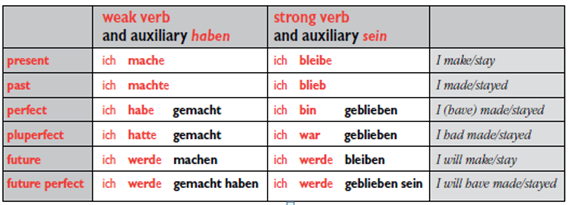In this lesson, you will learn everything you need to know about strong, weak and mixed verbs.
Thank you for reading this post, don't forget to subscribe!CONTENTS
Regular (weak) verbs
Irregular (strong) verbs
Mixed verbs

Every German verb has three main parts (infinitive, past tense, and past participle) for all weak, strong, and irregular verbs.
For example:
| infinitive | past tense | past participle | |
| weak | spielen | spielte | gespielt |
| strong | gehen | ging | gegangen |
| irregular | kennen | kannte | gekannt |
Knowing these parts is super helpful for forming all the other tenses, plus the passive voice and subjunctive moods. Here’s a quick breakdown:
- Infinitive: This is the form you’ll find in dictionaries. It’s the base for the present tense and subjunctive I, and it’s also used to make the future tense and conditional mood.
- Past tense (First Person Singular): This is what you use to create subjunctive II.
- Past participle: You use this to form compound perfect tenses and the passive voice.
Irregular verbs are a bit different from regular ones because they change the stem in the present tense, past tense, and past participle. They’re split into two groups: strong verbs (starke Verben) and mixed verbs (gemischte Verben).
Regular (Weak) Verbs/ Regelmäßige (Schwache) Verben
Most German verbs are weak verbs and follow the same pattern in the present and the past tense; that’s why they are sometimes also called regular verbs (regelmäßige Verben). You cannot see from the stem whether a verb is weak or strong, so it is best to learn the pattern of a verb straight away: machen, machte, gemacht
The stem of the weak/ regular verbs NEVER changes.
The conjugation of the verb machen- to do,to make
| Present tense | Preterite/ Past tense | Perfect tense | |
| ich | mach-e | mach –te | habe gemacht |
| du | mach-st | mach –test | hast gemacht |
| er,sie,es | mach-t | mach –te | hat gemacht |
| wir | mach-en | mach –ten | haben gemacht |
| ihr | mach-t | mach –tet | habt gemacht |
| sie/Sie | mach-en | mach –ten | haben gemacht |
This is the pattern for the conjugation of the verbs in the present tense.
Take the –en or –n off the infinitive of the verb to find the stem.
| infinitive | stem |
| machen | mach |
| spielen | spiel |
| fragen | frag |
then add the personal endings:
| sing. | plur. | |
| first person | -e | -en |
| second person | -(e)st | -(e)t |
| third person | -(e)t | -en |
| present tense | ||||
| ich | mach-e | I do | arbeit-e | I work |
| du | mach-st | you do | arbeit-est | you work |
| er,sie,es | mach-t | he/she/it does | arbeit-et | he/she/it work |
| wir | mach-en | we do | arbeit-en | we work |
| ihr | mach-t | you do | arbeit-et | you work |
| sie/Sie | mach-en | they/ You do | arbeit-en | they/ You work |
Note that the formal form Sie for you is exactly like the sie – they (except that it is written with a capital letter) so you don’t have to learn it.
The endings for we – wir, they – sie and you – Sie (formal) are all the same as the infinitive ending. All you have to memorise are the verb endings for ich, du, er/sie/es and ihr.
If you are not likely to be using the du and ihr forms, you only have to remember that the ich form ends in –e and that the er/sie/es form ends in –t; and you probably know that already!
Irregular (Strong) Verbs / Unregelmäßige (Starke) Verben
Strong verbs are those which occasionally change the stem of the verb. Originally, these stem changes were made to make easier pronunciation of certain verb forms.
In the present tense, the strong verbs only change their stem in the du and er/sie/es forms. The other ‘persons’ remain unchanged.
Here are some of the most significant examples.
| Changes from: | -e- to -i- | -e- to -ie- | -a- to -ä- |
| ich | geb-e | lese-e | fahr-e |
| du | gib-st | lies-t | fähr -st |
| er,sie,es | gib-t | lies-t | fähr -t |
| wir | geb-en | les-en | fahr -en |
| ihr | geb-t | les-t | fahr -t |
| sie/Sie | geb-en | les-en | fahr -en |
Look at the table the verb geben – to give in other tenses:
| present tense | Past tense | Perfect tense | |
| ich | geb-e | gab | habe gegeben |
| du | gib-st | gab-st | hast gegeben |
| er,sie,es | gib-t | gab | hat gegeben |
| wir | geb-en | gab-en | haben gegeben |
| ihr | geb-t | gab-t | habt gegeben |
| sie/Sie | geb-en | gab-en | haben gegeben |
Gehen / to go
| Prezent | Preterit | Perfekt | |
| ich | geh-e | ging | bin gegangen |
| du | geh-st | ging-st | bist gegangen |
| er,sie,es | geh-t | ging | ist gegangen |
| wir | geh-en | ging-st | sind gegangen |
| ihr | geh-t | ging-t | seid gegangen |
| sie/Sie | geh-en | ging-en | sind gegangen |
Click on:
Grammar Contents
The verb stem of irregular/strong verbs differs from regular/weak verbs.
In the 1st and 3rd person singular, strong verbs in the preterite/past tense do not have any ending: /, -st, /, -en, -t, -en.
The perfect tense is formed using the verb sein or haben and the perfect participle (participle II) which is formed using the prefix ge- and the ending -en.
In simple verbs, that is, verbs without a prefix such as, for example, the verb geben, prefix ge- comes before the verb stem: -geb-, and the suffix -en is added, so that we get participle II – gegeben.
For verbs with a separable prefix, ge- is inserted between the prefix and the verb stem: aufgegeben.
In the case of verbs with an inseparable prefix, the ge- is omitted: ergeben.
The conjugation of the verb geben
| Present tense | Preterite/ Past tense | Perfect tense | |
| ich | geb-e | gab | habe gegeben |
| du | gib-st | gab-st | hast gegeben |
| er,sie,es | gib-t | gab | hat gegeben |
| wir | geb-en | gab-en | haben gegeben |
| ihr | geb-t | gab-t | habt gegeben |
| sie/Sie | geb-en | gab-en | haben gegeben |
The conjugation of the verb gehen
| Present tense | Preterite/ Past tense | Perfect tense | |
| ich | geh-e | ging | bin gegangen |
| du | geh-st | ging-st | bist gegangen |
| er,sie,es | geh-t | ging | ist gegangen |
| wir | geh-en | ging-st | sind gegangen |
| ihr | geh-t | ging-t | seid gegangen |
| sie/Sie | geh-en | ging-en | sind gegangen |
Click on:
Grammar Contents
Mixed Verbs /Gemischte Verben (Mischverben)
Mixed verbs are verbs that take on the properties of both weak and strong verbs.
Mixed verbs behave in the preterite and participle II like weak verbs.
In the preterite they get the endings -te, -test, -te, -ten, -tet, -ten.
Participle II form with ge- + verb stem + -t.
In addition, mixed verbs in the preterite change the verb stem, which is a property of strong verbs:
kennen – kannte – gekannt
denken – dachte – gedacht
The conjugation of the verb denken
| Present Tense | Preterite/ Past tense | Perfekt tense | |
| ich | denk-e | dach-te | habe gedacht |
| du | denk-st | dach-test | hast gedacht |
| er,sie,es | denk-t | dach-te | hat gedacht |
| wir | denk-en | dach-ten | haben gedacht |
| ihr | denk-t | dach-tet | habt gedacht |
| sie/Sie | denk-en | dach-ten | haben gedacht |
See more:


